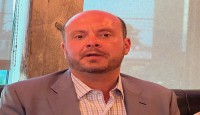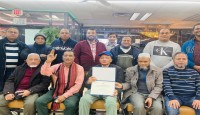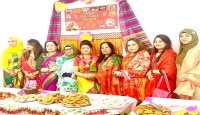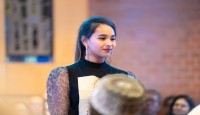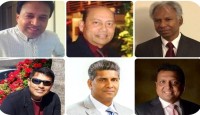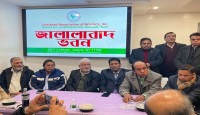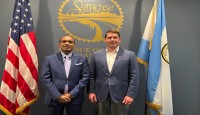My father: A Secular Man and his Harmonious Philosophy in Educating his Children
Dr. Pamelia Riviere
My father,
A benevolent soul,
Striding confidently in his weathered wooden sandals,
Tick, tick, tick!
His constant shadow following my every step,
Everywhere I go,
Whether I am soaring high on joy’s wings
Or weighed down by despair!
He walks alongside me
Through the tapestry of daily life,
Viewing my world through the lens of playful childhood rhymes,
One step, then another!
He weaves tales of rustling grass,
And shimmering dew
that dances in the soft glow
Of early morning light!
My father marveled at the beauty of rippling lake waters,
Glistening in sunlight,
Waving at me holding the delicate scarf
Of dusky rose clouds at dusk!
I can feel my father drifting alongside me,
With the Magic wand in hand
Enchanting my thinking heart,
He beckons me to awaken my senses!
Urging me to see the world anew,
Calling me to open my eyes,
Swaying my mind in a sweet dream,
With a lucid spirit unbound!
In this narrative, I reflect on the profound concepts of 'Value' and 'Self' that my father instilled in me, emphasizing the significant role he played in shaping my educational journey. My personal experiences, particularly those rooted in the informal educational environment of our home, alongside my father's philosophical beliefs, converge to form the foundation of my own educational philosophy. Central to his teachings was the idea of 'whole child building,' known in ancient India as Shopmpurna Manushya, which encompasses the holistic development of the individual.
Through his nurturing approach, he emphasized self and soul development, striving to transcend personal limitations and support the community, particularly during the turbulent times of The Liberation War of 1971, which deeply influenced my life and perspective. Growing up in a liberal Muslim family in Bangladesh provided me with a unique vantage point, as I was sheltered from the more conservative interpretations of Islam. Living in a predominantly Hindu neighborhood afforded me the opportunity to engage with and participate in a variety of cultural rituals and religious festivities, fostering an openness toward diverse beliefs and practices.
During my time as an M.Phil. student in the Anthropology Department at Dhaka University, my curiosity about anthropological studies expanded, leading me to explore the rich tapestry of cultures, including that of Bengali Muslims and the historical Hindu culture of British India and Bengal. My Master's degrees in Sociology and Environmental Studies further equipped me with theoretical frameworks to better analyze societal constructs, gender relations, developmental issues, education, and political dynamics.
The influence of my father's life and his educational principles, along with his liberal religious philosophy, has left an indelible mark on my own educational path, significantly shaping my voice and sense of agency. As a gender-sensitive community leader and businessman, my father stood as a proponent of an education that echoed the ideals of the Indian Renaissance.
This movement, sparked by thinkers like Shah Wali Ullah in the 18th century, sought to revive comprehensive studies of traditional Islamic disciplines, culminating in the establishment of the renowned Darul Uloom of Deoband in Northern India in 1866. Remarkably, as a Bengali Muslim student of Deoband, my father drew inspiration from the secular leadership that emerged post-1947, during the formation of Pakistan. Despite the existence of a state defined by Islamic principles, the leadership remained committed to building a liberal and peaceful Islamic society.
Like many of his Deobandi contemporaries, my father stood against the partition of India along sectarian lines and advocated for a democratic form of governance. His unwavering belief in religious freedom, peace, and tolerance instilled in me a deep commitment to these ideals, forever enriching my educational philosophy and defining my role within the broader community.
His rich religious and educational background deeply involved him in traditional religious sciences, particularly the revealed Islamic sciences. This journey encompassed the study of various languages, including Arabic, Urdu, Farsi, Bengali, Hindi, and English, alongside the realms of logic and other rationalistic disciplines.
His rigorous education didn’t shy away from the pursuit of science and mathematics, reflecting a liberal philosophy that embraced both scientific inquiry and spiritual understanding. My father’s holistic approach to Islam revealed a seamless compatibility with science, and he fervently advocated for the necessity of delving into rationalist disciplines.
This nurturing philosophy profoundly influenced my personal development and shaped my emotional, mental, spiritual, and holistic education. Growing up in an environment rich in holistic pedagogy, I felt deeply supported and nurtured as a whole child. It was a home where learning was interwoven with the essence of life itself.
My father often espoused a guiding principle that resonated within me: broadening one’s horizons and translating vision into action leads to true freedom and happiness. A verse that he repeated frequently became a mantra in my life: "One step, then another (Ak pa ak pa kori)/ Two steps are made (Dui pa ogroshori)." This mantra was drawn from his favorite Bengali poem, which poignantly illustrates the gradual journey of self-improvement through facing life’s struggles. This verse has become the very foundation of my life curriculum.
Art played a vital role in my family's educational ethos, weaving creativity into our daily lives. To teach us about shapes, my father ingeniously introduced the complexities of drawing a banyan tree, a symbol of life and interconnectedness. My mother, with her nurturing spirit, guided us in the delicate art of pottery, turning sticky clay into not just objects but joyful experiences.
As we molded the clay, she intertwined math lessons with enchanting stories, using beautiful earthen dolls she acquired during the vibrant Bengali New Year festival. My father's storytelling was a rich tapestry woven throughout my childhood, filled with vivid imagery and wonder. I recall the magical evenings spent lying on bamboo mats beneath a star-studded sky, surrounded by my brothers and sisters at our riverside home by the Brahmaputra.
There, he transported us to the cosmos through captivating tales of constellations and the seven sisters of Indian astronomy, leaving an indelible mark on our imaginative minds.
My father not only ignited my passion for the cosmos by teaching me the names of the stars and terrestrial planets during our starlit nights lying on the rooftop, but he also instilled in us a profound understanding of our planet’s place in the vast expanse of the solar system. He would explain the intricate dance of the earth as it revolves around the sun, detailing the distances that separate us from our celestial neighbors.
On balmy evenings, with the Milky Way stretching across the sky, he would point out constellations, transforming the dark canvas above into a living map of tales and wonders. In addition to these celestial lessons, my father introduced us to the rich tapestry of local agriculture by taking us to the annual agricultural fair.
There, we would meander through stalls adorned with a dazzling array of exotic fruits and vegetables grown in our region, immersing ourselves in vibrant colors, tantalizing aromas, and fresh tastes. To further ground our learning in the tangible world, a large world map adorned our study room wall, a colorful portal to geography that we would explore together.
We would trace the borders of distant countries and the winding paths of rivers, all the while fostering a curiosity about the diverse cultures that inhabit our planet. His approach to education was far from traditional. He believed in the power of hands-on experience, arranging visits to local factories, mills, and industries, where we would come face-to-face with the mechanics of production and labor.
These excursions were more than mere field trips; they were invitations to engage with the world around us, spurring us to reflect on our experiences and articulate our thoughts through writing. Through all of this, my father embodied a curious spirit, eager to gather knowledge about science, health, and discoveries. His teaching methods reflected a culturally sensitive yet radical pedagogy, one rooted in practicality and real-world application.
Drawing from my personal experiences, I advocate for an educational framework that embraces informal and natural pedagogies. This approach seeks to connect the body, mind, and spirit of the learner, allowing them to interpret information, recognize the world, and organize their thoughts harmoniously.
As I contemplate my own journey, the threads of my autobiography, research design, and the proposed radical pedagogy framework for science education in Bangladesh are intricately intertwined. At the core of this framework are the themes of developing a peaceful society, nurturing the whole child, and fostering universal love within children. I consider myself fortunate that my parents instilled these values in me from a young age. In a country like Bangladesh, which grapples with persistent internal conflicts, the pursuit of peaceful coexistence often feels precarious.
I believe a contemplative and radical pedagogy possesses the transformative potential to teach a culture of peace through science curricula. Without a learner-centered approach that encourages reflection and action, the evolution of pedagogy into a truly radical form is unattainable.
My firsthand experiences with holistic education at home and my parents’ involvement in my informal education have guided me to design a radical pedagogy framework that aligns with a whole child curriculum—Sanskrit for "Sompurna Manushya Pathyakrama"—capable of transforming secondary science education in Bangladesh.
Reflecting on lessons of values and responsibility, I share a poignant story from the Liberation War in Bangladesh. In 1971, a violent tide of conflict surged through the capital city of Dhaka, quickly engulfing the entire country in a wave of devastation, marked by the harrowing loss of countless innocent lives in what was then East Pakistan.
Amid this turmoil, my father faced a heart-wrenching dilemma: should he send his children to our grandfather's home for safety, or should we remain in the pursuit of our education during these tumultuous times? His unwavering commitment to our schooling often took precedence over our immediate safety.
Tragically, in the midst of this chaos, my brother—an exuberant and talented young man of just 23, a graduate student, and a celebrated soccer player—was captured by the collaborators of the Pakistani Army. In a cruel twist of fate, they tortured him mercilessly before handing him over to the military, boasting of their “catch” of a so-called freedom fighter, a Muktijodhdha.
My father, desperate to rescue his son, poured every ounce of effort into securing his release, yet the odds were stacked against him. One fateful night, against all expectations, my brother managed to escape. He broke through the prison window and walked barefoot more than 10 miles along the banks of the Brahmaputra River, his body battered yet his spirit unyielding.
An urgent telegram soon arrived for my father, demanding the immediate return of his son to the clutches of the authorities or face dire consequences for our village. That dark, contemplative night is etched in my memory.
My mother refused to surrender her son, while my brother, deeply traumatized and filled with anguish, vehemently opposed the idea of returning to their prison. He unveiled the horrific evidence of his mistreatment—his wrists, arms, and legs marked by the brutal scars of violence. A shattered young man sought refuge and solace, yearning to rest upon his mother's lap.
Yet, torn between love and the safety of the family, my father made the agonizing decision to comply with the order, believing that his act of honesty would guide his son back home soon. Even in the face of despair, he comforted my mother with the hope that soon she would cradle her son again.
However, despite his best efforts to shield us from harm, the cruel realities of war stole my brother away that stormy night—a harbinger of doom that had loomed over us like a relentless thundercloud. He never returned home, and our family fell victim to the tragic genocide that unfolded in 1971.
Yet, through all the heartache, my father stood as a beacon of courage. In those dark days of war, when Hindu neighbors were targeted by the collaborators of the Pakistani Army, my father bravely defended them. He argued passionately for their lives, unwavering in his conviction that humanity transcends such divisions, standing firm against the tide of hatred and violence that threatened to engulf them all.
His actions in those dire times etch an indelible mark on my understanding of courage, compassion, and the critical importance of human dignity amidst chaos.
The writer is a freelance writer and analyst. She pursued her Ph.D. in Curriculum and Pedagogy from University of Toronto, Canada. She can be reached at [email protected]
The poem is dedicated to all benevolent fathers.

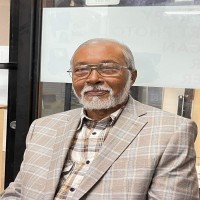

.jpg)
